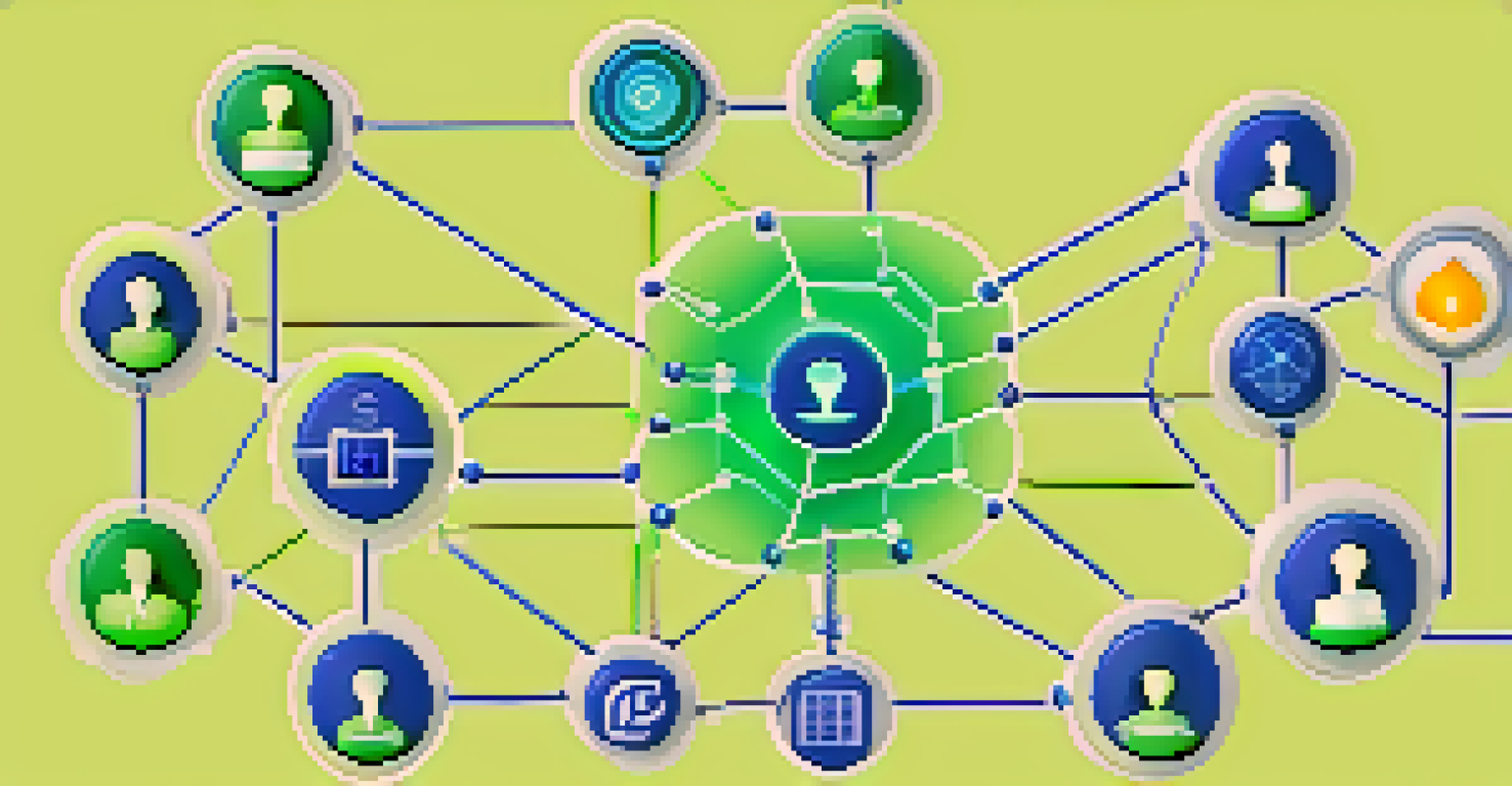The Importance of Networking in Online Learning Communities

Understanding Online Learning Communities
Online learning communities are virtual spaces where students and educators connect, share knowledge, and support each other's growth. These communities can range from forums and social media groups to dedicated platforms for specific courses. The beauty of these spaces lies in their ability to break geographical barriers, allowing individuals from diverse backgrounds to collaborate and learn together.
The beautiful thing about learning is that no one can take it away from you.
In these communities, participants have the opportunity to engage with new ideas, seek help, and provide assistance to others. Interaction often leads to deeper understanding and retention of information, making learning more enriching. Additionally, the sense of belonging that comes from being part of a community can be incredibly motivating for learners.
However, merely being a part of an online learning community isn't enough; active participation is essential. This is where networking comes into play, enabling members to build relationships that can enhance their educational journey.
Building Relationships for Collaborative Learning
Networking within online learning communities fosters valuable relationships that can lead to collaborative projects and study groups. When learners connect, they can share resources, exchange feedback, and even brainstorm solutions together. This collaboration not only deepens understanding but also makes the learning experience more enjoyable.

For instance, imagine a group of students studying a complex subject like data science. By networking, they can form study groups where they discuss challenging concepts and work through problems collaboratively. This shared effort often leads to breakthroughs that might be difficult to achieve alone.
Networking Enhances Collaborative Learning
Engaging with peers in online communities fosters valuable relationships that lead to collaborative projects and deeper understanding.
Moreover, these relationships can extend beyond the classroom, resulting in long-term professional connections that may benefit learners in their careers. Networking helps individuals not only academically but also professionally, laying a foundation for future collaborations.
Expanding Knowledge Through Diverse Perspectives
One of the most significant advantages of networking in online learning communities is access to diverse perspectives. Every participant brings unique experiences and insights, which can enrich discussions and broaden understanding of a topic. Engaging with different viewpoints encourages critical thinking and helps learners consider alternative solutions.
Education is the most powerful weapon which you can use to change the world.
For example, a marketing student might learn about social media strategies from a peer studying psychology, who can provide insights into consumer behavior. Such cross-disciplinary exchanges can spark innovative ideas and inspire creative approaches to problems.
Embracing this diversity not only enhances individual learning but also cultivates a culture of inclusivity within the community, making everyone feel valued and heard.
Enhancing Communication Skills Through Engagement
Active networking in online learning communities can significantly enhance communication skills. As learners interact with peers and educators, they practice articulating their thoughts, asking questions, and providing constructive feedback. These interactions can help individuals become more confident communicators, which is an invaluable skill in both academic and professional settings.
Consider a scenario where a student participates in a discussion forum, sharing their insights on a topic and responding to others’ comments. This practice not only hones their writing and analytical skills but also teaches them how to engage in respectful debates. Learning to navigate different communication styles can prepare individuals for future teamwork and collaboration.
Diverse Perspectives Enrich Learning
Access to varied insights within online learning communities encourages critical thinking and innovative problem-solving.
Furthermore, effective communication is essential in today’s job market, where many roles require teamwork and clear articulation of ideas. Networking provides a safe space for learners to develop these skills in a supportive environment.
Accessing Resources and Opportunities Through Networking
Networking often opens doors to new resources and opportunities that might not be readily available. Through connections made in online learning communities, members can share valuable materials, such as articles, tutorials, or even job leads. This shared resourcefulness enhances the overall learning experience and empowers individuals to take charge of their education.
For instance, a student might discover a free online workshop or a scholarship opportunity through a discussion with peers. These opportunities can significantly impact their learning journey, providing them with additional tools and experiences to further their education.
Moreover, networking can lead to mentorship opportunities, where experienced members guide newcomers, sharing insights and advice that can be crucial for academic and career success.
Fostering a Supportive Learning Environment
Networking is essential for creating a supportive atmosphere in online learning communities. When members actively engage and connect, they contribute to a culture of encouragement and motivation. This support can help learners overcome challenges and stay committed to their educational goals.
Imagine a learner facing difficulties in a course; by reaching out to their network, they can find others who have faced similar struggles. Sharing experiences and solutions can alleviate anxiety and inspire perseverance. Knowing that others are in the same boat can make a significant difference in a learner's confidence.
Supportive Networks Boost Motivation
Active networking creates a supportive atmosphere that helps learners overcome challenges and stay committed to their goals.
In essence, a strong network transforms the online learning experience into a collaborative journey where everyone feels empowered to succeed.
Leveraging Networking for Lifelong Learning
Finally, networking in online learning communities encourages a mindset of lifelong learning. By connecting with others who are passionate about continuous education, individuals can stay informed about new trends, resources, and best practices in their fields. This ongoing connection helps keep the spark of curiosity alive.
For example, a professional in the tech industry might join an online learning community to keep up with emerging technologies. Through networking, they can discover webinars, conferences, and courses that align with their interests. This proactive approach to learning not only enhances their skill set but also positions them as leaders in their field.

Ultimately, networking cultivates a culture of curiosity and growth, reminding learners that education doesn't end with a certificate but continues throughout their lives.